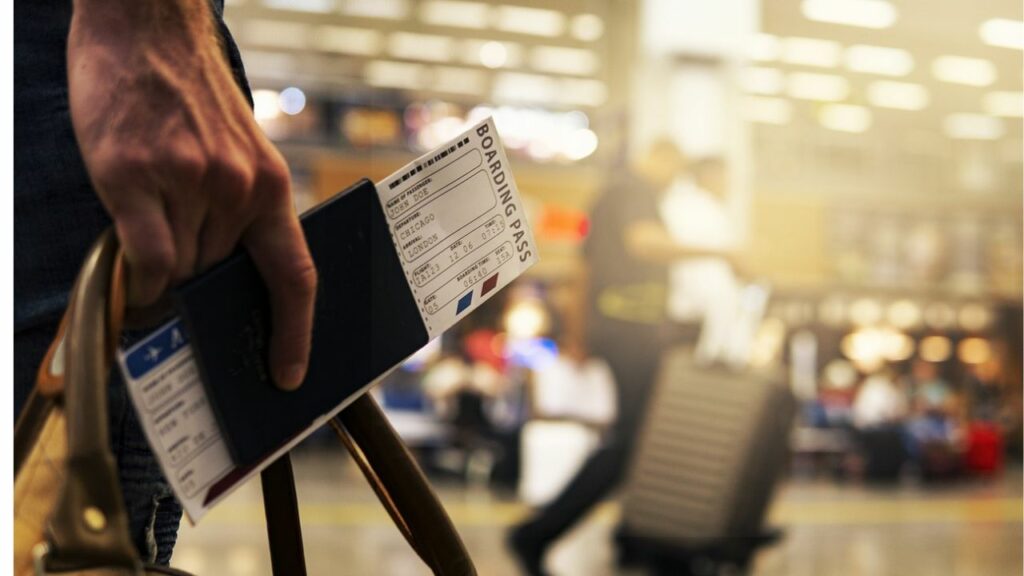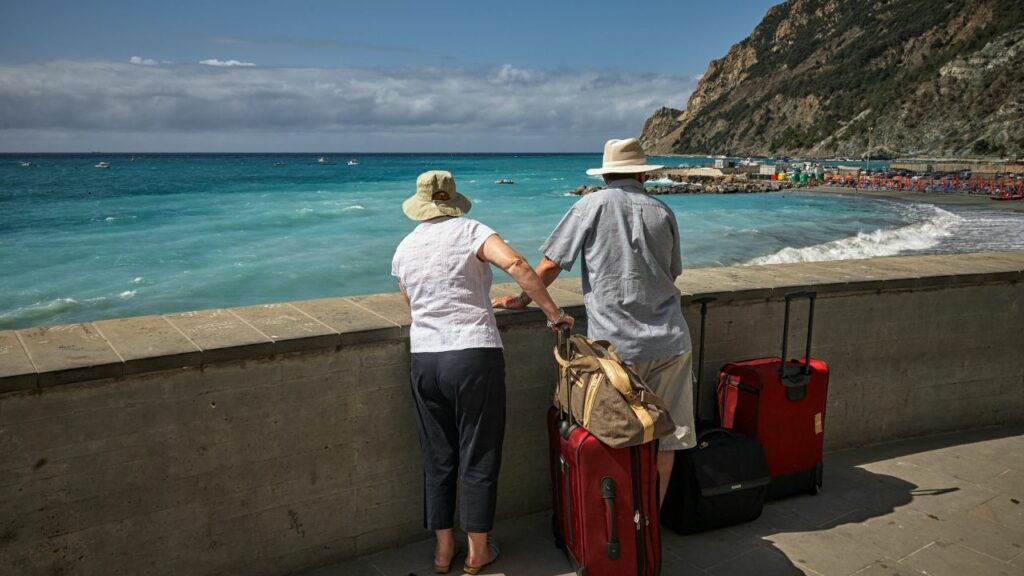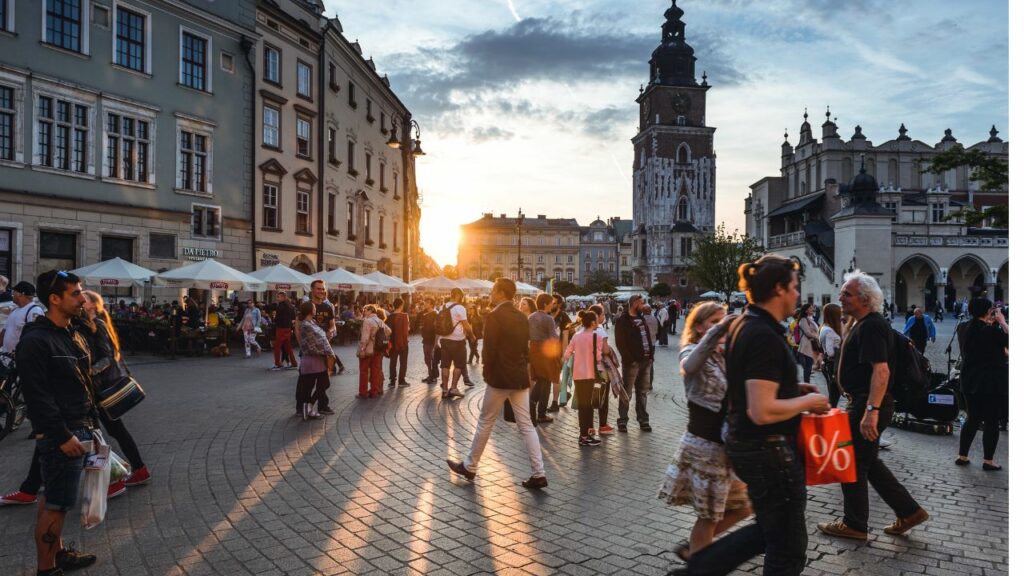Picture this – it’s the good old days. Customers saunter into a travel agency, flip through glossy brochures, point at their dream holiday spot, and voila! The agency takes care of the rest. Travel SEO? Never heard of it.
Fast forward to the present, where holiday planning takes on a whole new meaning. Armed with a computer, tablet, or smartphone, your potential customers journey through a labyrinth of online information, meticulously researching their ideal destination before making a decision.
So here’s the million-dollar question: when they punch in their dream vacation into that search engine, is your travel website making a grand appearance in the search results?
(Check out this travel SEO Case Study to see how we work)
The State of the Travel Industry

Today, you can be your own travel agent. With websites like Booking and AirBnB getting larger by the day, small travel agencies have to fight an uphill battle to start ranking and, more importantly, to continue selling bookings.
With an online travel market share of around 40%, online travel agents have certainly stepped into the ring and are putting up quite a fight. If you consider the fact that the industry’s gross bookings amounted to $1.6 trillion in 2017, you can just about imagine the size of that ring, and the quality of the gloves you need to have to put up a decent show.
Before we dive into the actual ranking factors and SEO best practices, there are several key points to bear in mind about the niche itself:
- Two types of websites compete for the top spots: those offering services (travel agencies, hotels, airlines, etc.) and those promoting content (personal blogs, travel blogs, review websites, etc.). You will be competing against both, to a certain extent.
- Search engines have become a traveller’s preferred way of researching all things travel.
- People will most often enter more general terms as a search query – they will rarely look for a specific agency or hotel – in other words, ranking for long-tail keywords is crucial.
- A visitor will not convert on the first visit and will rarely visit just one travel website – they will do a fair amount of research, explore several options, and then make their choice. Your goal is to have them return rather than get that conversion as soon as possible.
To better illustrate that last point, and to better acquaint you with the journey a visitor is on when they land on a travel website, here is a very short overview of the different stages of their buyer cycle:
- Dreaming moments – the “looking for inspiration” stage, where people are still unsure where they want to travel next.
- Planning moments – once they have settled on a destination, people will start looking for accommodation, flights, and things to do while there.
- Booking moments – once they have done their research and found what they believe to be the best deal and option, they book their stay and transportation.
- Experiencing moments – while on holiday, people like to share their experiences or relive their happy memories once back home.
While you will certainly want to be a part of their “booking moment”, you should never underestimate the power and allure of others. After all, customer awareness is a step closer to a conversion than customer ignorance.
Now for the facts.
Why is Travel SEO Important?
Travel SEO plays a vital role in making a travel website stand out in the highly competitive arena of the online world. It allows businesses to reach their target audience effectively by ensuring a higher ranking in search engine results. In today’s heavily digitised world, a strong online presence is crucial to the success of any travel business.
One of the critical aspects of travel SEO is providing relevant and well-organised content to visitors. This not only improves user experience but also helps search engines index and understand the webpage’s content more effectively. By providing rich, informative content, a travel website can establish itself as a trustworthy resource and attract users from various channels.
Why do Travel Businesses Need SEO?

SEO helps travel companies reach a wider audience by improving their rankings on search engine result pages. When travellers search for specific terms related to the industry, businesses with higher rankings are more likely to be clicked on. For instance, a company that ranks highly for keywords like “cheap flights” or “bucket list destinations” will attract more attention and potentially increase bookings.
Content creation is another vital aspect of SEO, offering SEO tips for businesses. Businesses need to produce high-quality, informative content. Well-crafted content can enhance user experience and make a travel website more appealing to both search engines and users. This content should include engaging blog posts, relevant travel tips, and visually appealing images or videos, all optimised with popular and targeted keywords.
After researching and selecting target keywords, incorporate them into your travel website’s content, meta titles, descriptions, and URLs, as well as into your blog and social media content. Ensure that your content is engaging, informative, and satisfies the search intent of the target audience.
In summary, effective keyword research for SEO involves using research tools, considering local SEO, analysing competition, and incorporating the chosen keywords into various aspects of your travel website and content. With a well-planned keyword strategy, your travel business can improve its visibility on search engines and reach a wider audience.
Top Ranking SEO Factors in the Travel Industry
The five most important ranking factors in the travel industry are:
- Word count – pages that rank in the top 10 will often have more than 2500 words.
- Content relevance – the information you present on the page should match user intent. In other words, don’t try to force a sale on every page.
- Several images – pages that rank well will have a lot of images, but it’s more due to the quality of said images than their sheer number. You want to tell a story, help people imagine themselves, and illustrate the destination – not pile on random images of random beaches.
- Bullets per list – pages that rank well will have more bullet points – because people want to find relevant, structured and useful information, the information they can easily skim through.
- The number of internal links – top ranking pages boasts over 150 internal links (23% more than average). This is especially true for large websites with thousands of pages. In other words, make sure your visitors can seamlessly browse your website and that your internal linking structure is logical to crawlers and your potential customers.
While these factors are considered the most important ones, let us not forget that they are only one part of a larger puzzle. Here is our SEO agency in Dublin does SEO – a shorter and sweeter version of our blueprint. Please bear in mind that we could have gone into much more detail on any of these points – but we do want you to give us a call, don’t we?
For more info, read our Tourism SEO guide as well.
On-Page Travel SEO
On-page travel SEO plays a crucial role in enhancing the visibility and search rankings of a travel website. In this section, we will discuss some key elements of on-page SEO, such as title, description, images, meta descriptions, schema, and meta tags.
By focusing on these aspects of on-page SEO, you can enhance the user experience and improve search engine rankings for more visibility, traffic, and conversions.
Link Building and Off-Page Travel SEO
A strong link building strategy is critical for travel websites to enhance their off-page SEO. Link building involves obtaining hyperlinks from other websites, aiming to increase the site’s visibility on search engine results. Developing an effective link building campaign includes focusing on both external and internal links, increasing the overall domain authority.
External links, also known as backlinks, involve securing hyperlinks from other reputable websites within the travel industry. One of the main objectives in obtaining external links is to foster strong relationships with well-established players in the sector. It is vital to create engaging, high-quality content that encourages authoritative websites to link back to your site. Examples of travel-related media include collaborations with bloggers and influencers, as well as guest posting.
Internal links, on the other hand, are hyperlinks within the travel website that point to other relevant pages on the same domain. A well-thought-out internal linking structure guides both users and search engines through the site while reinforcing the relevance of specific pages or topics. For travel websites, this could mean linking to blog posts discussing the same destination or connecting content about similar travel experiences.
Alongside a robust link building strategy, it’s crucial to optimise other off-page SEO factors, such as social media profiles. An active presence on popular social media platforms like Instagram, Facebook, and Twitter can drive traffic and generate additional backlinks. Sharing engaging, visually appealing content relevant to your travel niche can help increase your site’s visibility on search engine results.
Overall, implementing a comprehensive link building and off-page SEO strategy is essential for travel websites. By focusing on acquiring quality backlinks, establishing a solid internal linking structure, and leveraging social media profiles, website owners can improve their search engine rankings and attract more organic traffic to their travel-related content.
Local SEO for Travel Websites
Local SEO is a critical component of a successful marketing strategy for travel businesses. According to Ahrefs, ranking in both regular organic results and the “map pack” can enhance your visibility on the first page of Google and other search engines. To optimise for local SEO, include location-specific keywords in your research. Implementing local SEO strategies, alongside traditional SEO practices, can significantly boost your travel website’s visibility in local search engine results.
Website Audit

If you have been running a travel website for a while, you already have a lot of assets in place (both on and off your pages). The first step in any successful campaign is an SEO website audit which will tell you what to focus on to see the best results as soon as possible. This may unearth anything from duplicated content issues to crippling internal linking.
These are the two factors that most often cause ranking drops – large websites will often inadvertently have a lot of duplicate content, which is sometimes an easy fix but can also take a fair bit of work, depending on what else we find.
Another issue we often encounter is poor website structure, which makes it very hard for a user to find their way around. This will not only hurt your rankings but also lose customers. Which will lower your rankings.
Technical SEO
Page speeds, loading times, image sizes, server issues and everything that falls under the “technical” category is usually a one-time fix. In the age of the mobile-first index, making sure your pages are responsive is a given. Having an SSL certificate is just as important as ensuring you are GDPR compliant.
Competitor Analysis
Once we know what your assets are, we take a look at what your competition is doing. This will involve anything ranging from the keywords they are not ranking for, the destinations they are promoting and how, the images they are using, the stories they are telling, and the backlinks they have in place.
How to Perform Keyword Research for Travel SEO

Parallel to competitor scrutiny, we do keyword research specific to your website and offer. This will tell us two things: what you should be ranking for and what keywords you should stop chasing. You’d be surprised how driving traffic to a seemingly non-converting page can up bookings. Of course, if you have the right website structure and tell the right story.
It will also be easier, and often much better, to rank for more specific keywords (for example, “couple’s rock climbing holiday” instead of “adventure holiday”). It will target a visitor at a more specific stage of the buyer’s journey when they are much more clear on what they need to find. These keywords can often be less competitive, but their main advantage is that they drive better conversion rates.
Pay Per Click Advertising
Hiring a Google Ads Agency to manage ad campaigns in the travel niche can often be expensive. This is why we run yet another keyword research, PPC specific, and see your odds of outdoing the competition. While investing in paid ads can often drive some quick results, we would always give our other tactics a spin, too – they are more focused on the long term and will remain in place long after your PPC ads have stopped running.
Email Marketing
Even though people believe it extinct for some unknown reason, email marketing is an excellent way to reach existing and interested parties, and perhaps inspire them to start planning their next trip. The main challenge here is to find that proper blend of promoting your latest deals and showcasing a destination you are putting together trips for.
Travel Content Marketing
We have touched on the importance of telling the right story several times, and now we finally get to explain why we keep going on and on about it. Storytelling is much more important in the travel industry than in any other niche online.
Even though we are discussing content marketing for travel companies, this step needs to be somewhere between the research and the marketing part of your SEO journey.
Crafting landing pages that are not hell-bent on selling – pages that will be detailed, informative, and captivating enough to capture a reader’s imagination and answer a certain query will have a much easier shot at ranking. While they will not convert, a clever internal linking structure and call to action will nudge your visitors in the right direction.
You may or may not have such landing pages in place. If you do and already rank somewhere for them, we can take it from there and work on them. If not, we can create these pages for you – but we would still prefer to have your input on the actual text. After all, you know much more about your destinations than we do.
Having original images in place is also a bonus – you can use them to draw in additional links, and having a unique style of photography will help you stand out and stay memorable.
Once we have a page, everyone is happy to work with – promoting it becomes our focus. Depending on the page’s purpose, we will attract links to it as if by magic, all the while secretly counting down the days until our holiday begins.
If you are ready to go on this SEO journey with us, pack your bags and give us a call. Or shoot us an email. We are always on the lookout for our next adventure.

I am the founder and manager of BeFound SEO and the main consultant. I started offering SEO services back in 2007 when I had to explain SEO, as most people had no idea what it was and how much it could help their business online. I still love seeing the results from SEO.
When I’m not creating great strategy, I am usually out hiking up a mountain.
Connect with me on the links below.
